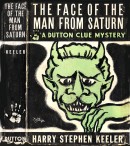 When the Caustic Cover Critic, who has a great eye for the bizarre and grotesque in book design (as well as the sublime), titles a post “Not Safe for Work, or Sane Humans,” I sit up and pay attention. The covers underneath the headline belong to the books of Harry Stephen Keeler (b. 1890). One site devoted to him says: “Today, if you’ve heard of him at all, it’s as the Ed Wood of mystery novelists, a writer reputed to be so bad he’s good.”
When the Caustic Cover Critic, who has a great eye for the bizarre and grotesque in book design (as well as the sublime), titles a post “Not Safe for Work, or Sane Humans,” I sit up and pay attention. The covers underneath the headline belong to the books of Harry Stephen Keeler (b. 1890). One site devoted to him says: “Today, if you’ve heard of him at all, it’s as the Ed Wood of mystery novelists, a writer reputed to be so bad he’s good.”
I hadn’t heard of him even as that, but further investigation was well worth it. First, plot synopses of two of his dozens of books:
A man is found strangled to death in the middle of a lawn, yet there are no footprints other than his own. Police suspect the “Flying Strangler-Baby,” a killer midget who disguises himself as a baby and stalks victims by helicopter. (X. Jones of Scotland Yard, 1936)
A disgruntled phone company employee calls every man in Minneapolis, telling him the morning papers will name him as the secret husband of convicted murderess Jemimah Cobb, who runs a whorehouse specializing in women with physical abnormalities. (The Man With the Magic Eardrums, 1939)
The Harry Stephen Keeler Society, based at Xavier University, maintains an informative web site. It also has a Twitter page dedicated, it seems, to showcasing Keeler’s sentences. (“Having no televisic gifts for seeing into the future, Penn Harding allowed his complex to be titillated.”; “To hell with all shirt salesmen!”) The site also has several examples of the original artwork and jacket copy for Keeler’s books, the best rabbit hole I’ve discovered in a while.
According to William Poundstone, Keeler, who wrote more than 70 novels, was committed to an insane asylum by his mother when he was a child. But, “Keeler cannot easily be pigeonholed as an ‘outsider.’ He was published by big houses internationally, and he was a pulp magazine editor as well.”
From a quick perusal of the evidence, it seems reading Keeler at any length would be a form of punishment. (McSweeney’s did reissue one of his books five years ago.) But reading about Keeler is a joy.
Back to the Caustic Cover Critic:
In learning more about Keeler, I came across Ramble House, a (then, at least) one-man operation dedicated to bringing all of Keeler’s works back into print. The owner, Fender Tucker, printed the books individually and then bound them in his kitchen with a hot glue gun and an iron.
God’s work.

